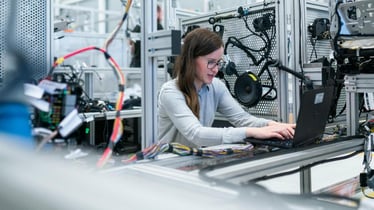1. Your Excellency, as doyen you represent not only your home country, Lebanon, but also the entirety of the ambassadors of the Arab states accredited in Germany. Which countries are these in detail and what is special about this function?
H.E.: It is an honor to be the Dean of the Arab Ambassadors in Berlin. The Dean is the Ambassador who has been posted for the longest time in Germany. As a region, we possess a common language and a common culture, we have close interests and we face the same kind of challenges.
I work together with my colleagues, the Arab Ambassadors in Berlin, who represent the countries that are members of the Arab League, within the framework of the Council of Arab Ambassadors, to strengthen the relationships of our countries with Germany not on a one-way basis but in a mutually beneficial manner.
2. What role do science and education play in the context of these countries' joint activities and exchanges?
H.E.: The Arab world as a whole possesses a large young and educated population. This is both an asset and a challenge. In every country, education is key to building a better future and ensuring social and generational integration. Therefore, education is an important part of the exchanges between our countries and Germany.
As for culture, it is the best way to build bridges between people. Where politics create fault lines, art and culture bring people together, which is why the Arab Ambassadors insist very much on this aspect of cooperation.
3. According to the German Academic Exchange Service (DAAD), 1,249 students from Lebanon were enrolled at German universities in the 2017/18 winter semester. How do you rate this high interest from your country for studying in Germany?
H.E.: There have been scientific and cultural links between Lebanon and Germany since the Middle-Ages, and these links still continue. Lebanese students – especially doctors and engineers – have been studying in Germany for almost one century now. Those students are attracted by the excellence of the German educational system, which is a model in the world. In addition, there are German schools and a Goethe Institut in Lebanon, which makes learning the German language easier.
4. What difficulties do you currently see in the access of students from non-EU countries to German universities?
H.E.: Besides legal and practical aspects – i.e. getting a visa – the main problem non-EU students face when wanting to access German Universities, is the language. This explains why many students from the Lebanon mostly choose either France or English-speaking countries. This is slowly changing because of the attractiveness of studies in Germany.
-Jan-05-2024-10-16-07-6843-AM-1.jpg?width=382&height=621&name=UU%20%26%20H_E_%20Dr_%20Mustapha%20Adib%20(1)-Jan-05-2024-10-16-07-6843-AM-1.jpg)
5. What measures do you think would make sense to reduce these hurdles?
H.E.: Many instruments are already in place, especially with German Embassies abroad and the Goethe Institut. However, we need a more direct and, above all, sectorial cooperation, either between ministries or between the Länder and the states.
Cooperations between universities, where the German party would help cut red tape for foreign students, would also be highly beneficial.
6. How do you assess the role of digital service providers such as Expatrio in facilitating the visa process and university access for foreign students?
H.E.: I think that a platform such as Expatrio is very important as it allows foreign students to plan their stay in Germany in all its aspects. Of course, to be really useful and efficient, such platforms must work directly together with universities and the administration.
7. What future do you see for cooperation in the field of immigration of skilled workers between the Arab states and Germany in general and between Lebanon and Germany in particular?
H.E.: Germany is in need of skilled workers, especially in the broader fields of healthcare, and science. On the other hand, the Arab countries turn out every year a great number of highly qualified professionals. This is especially true for Lebanon.
Therefore, I am sure that the number of skilled workers from Arab countries and Lebanon integrating the German labor market will increase steadily in the near future.





.png?width=374&name=Untitled%20(20).png)
.jpg?width=374&name=chuttersnap-xmPLXZvQIV8-unsplash%20(1).jpg)


